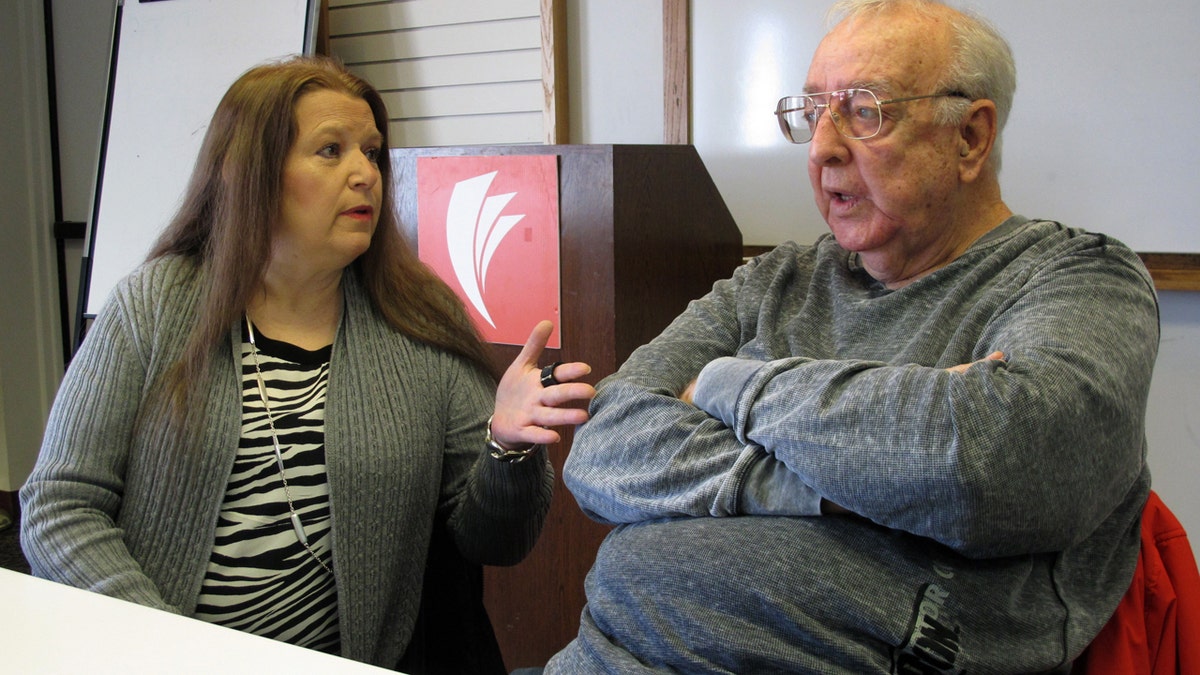
Jan. 30, 2017: Lori Cooper, left, discusses her efforts to bring to trial the suspect who shot her father, Columbus police officer Niki Cooper, in 1972, as Niki Cooper and partner Bob Stout, right, interrupted a burglary, in Columbus, Ohio. (AP Photo/Andrew Welsh-Huggins)
COLUMBUS, Ohio – An 82-year-old man who was indicted, but never prosecuted, in the nonfatal shooting of an Ohio police officer almost 45 years ago cannot be tried now, a judge ruled Thursday.
The case against Charles Hays fell through the cracks, and prosecutors acknowledged the state neglected the case. But they said he never demanded a speedy trial.
Franklin County Judge Guy Reece dismissed the case Thursday, saying Ohio had at least two opportunities over the past four decades to bring Hays back for trial.
Those came when Hays was in jail in Kentucky and in prison in Connecticut on charges unrelated to the 1972 shooting of Columbus officer Niki "Nick" Cooper.
A speedy trial is a constitutional right, the judge said as he announced his decision.
"Not only is it important for the defendant, but it's also important for society as a whole to have a criminal case resolved in a timely manner," Reece said.
Cooper was shot in the left arm in March 1972 when he and his partner interrupted a burglary. Cooper never regained full use of the injured limb, and he died just over three years ago at 71.
Hays was shot twice by Cooper and left a paraplegic, according to court records.
After Cooper died, an investigation by one of his daughters, Lori Cooper, brought the still-open case to prosecutors' attention. She fought back tears Thursday as she said she couldn't agree with the judge's decision.
No one should be able to shoot a police officer and not suffer the consequences, said Cooper, of central Ohio.
"I didn't accomplish what I set out to do, and that was to ensure that justice occurred. And that didn't happen today," she said.
The family wants the case appealed. Franklin County Prosecutor Ron O'Brien said he hasn't decided whether to do so.
Hays' attorney, Robert Essex, declined to comment afterward. He has said that the state missed opportunities to try Hays over the years, violating his speedy trial rights.
Two accomplices were charged and pleaded guilty. Both sides agree Hays was properly indicted on counts of intentional shooting, burglary and larceny. What happened afterward is in dispute.
O'Brien said Hays was aware of the charges even as he continued to commit crimes in Kentucky and Connecticut.
Hays was hospitalized for his injuries, first in Columbus, then at a veteran's hospital in Cleveland. Afterward, he went to Kentucky and ended up in jail where Ohio authorities were notified of his presence and told an ambulance would be needed to collect him.
In the early years after his indictment, Hays highlighted his medical condition as a reason he shouldn't be returned to the state, prosecutors argue.
The state's lax approach was illustrated by the fact that Hays has a current Ohio driver's license he's renewed twice and has lived at the same address in Dayton for 10 years, Essex has said.
Hays is in poor health and unavailable for an interview, Essex said.





















